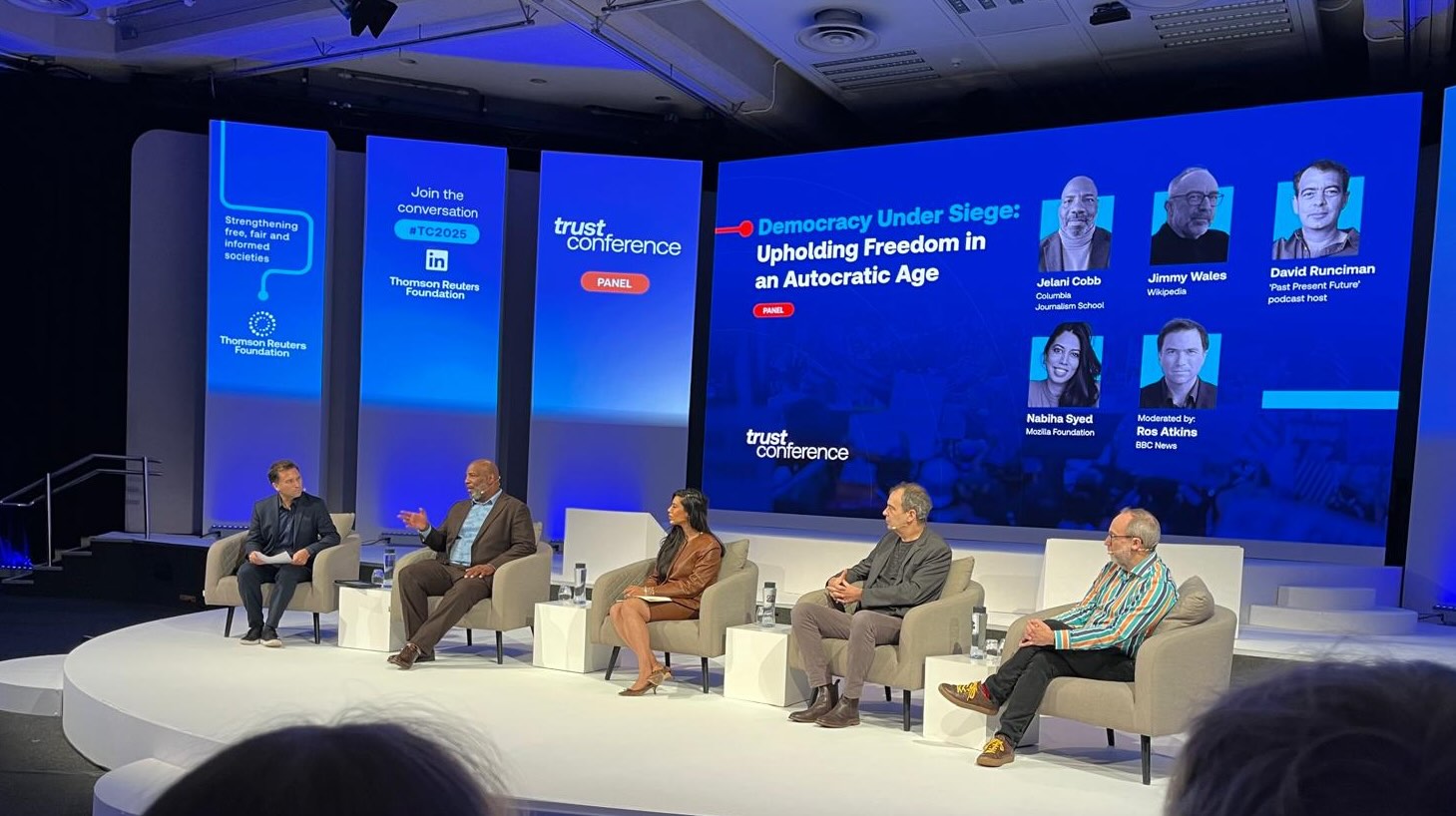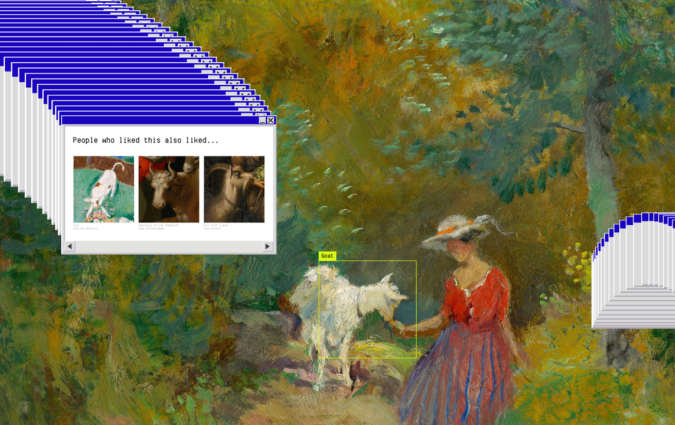Trust Conference 2025: Six things we learnt about the threats facing journalism today

BBC journalist Ros Atkins, Columbia Journalism Dean Jelani Cobb, Nabiha Syed from the Mozilla Foundation, academic David Runciman and Wikipedia founder Jimmy Wales at the Trust Conference.
On 21 October hundreds of delegates joined the Trust Conference, an annual event hosted in London by the Thomson Reuters Foundation, the core funder of the Reuters Institute. Speakers included journalists, technologists and human rights advocates such as Jelani Cobb, David McCraw, Frank Mugisha, Nevşin Mengü and Siddharth Varadarajan. Here are six takeaways from this year’s conference.
1. Threats from governments are on the rise
The first panel of the conference focused on the threats journalists faced from an increasing number of authoritarian governments, featuring voices from the United States and other countries going through democratic backsliding. .
“Media companies in the US have had their financial and corporate structures weaponised against them,” said Columbia Journalism School Dean Jelani Cobb, referring to Donald Trump’s strategy to muzzle high-profile news publishers throughout this year.
One of those publishers is the New York Times, which the US President targeted with a lawsuit earlier this year. Its senior VP and deputy general counsel David McCraw, who made headlines back in 2016 with a defiant letter responding to a previous threat from Trump, stressed the Times wouldn’t surrender this time either: “It’s safe to say Trump’s lawsuit hasn't had an effect on how our journalists do their jobs. We stand behind our newsroom; we won’t give in to the pressure or settle the case.”
This may be a new phenomenon for newsrooms in the US. But it’s certainly not new for outlets operating in countries such as India, Hong Kong and El Salvador, where journalists have been targeted for doing their jobs.
Frank Mugisha, executive director of Sexual Minorities Uganda (SMUG), reminded delegates that his home country has been going through similar issues for a long time. “Content creators and journalists can be arrested,” he said. “Uganda has had an authoritarian regime which creates conservative legislation to punish the outspoken.”
In the same panel, Nevşin Mengü, a Turkish journalist from Nevşin Mengü Media, also warned that laws apparently meant to protect people, such those against the spread of disinformation, have been weaponised against journalists in countries including her own.
The same is happening in India, said Siddharth Varadarajan, founding editor of The Wire. The country pioneered some of the trends we are now seeing elsewhere, with Prime Minister Narendra Modi escalating legal attacks on journalists and some now charged for very serious crimes, including sedition.
While panellists agreed on the diagnosis, there was some disagreement on how news organisations should tackle these challenges.
“When AP was banned [from the White House press pool over a refusal to adopt the name ‘Gulf of America’], no news organisation should have gone to the briefings until they were reinstated. We have to stand up for each other,” Cobb said.
“There's no question the autocratic playbook includes divide and rule,” said academic David Runciman, host of the Past Present Future podcast, who viewed an intervention of the kind Cobb suggested as potentially counterproductive. “This is still a political world. These fights will play out politically and there’s a danger of having a really activist media,” he said.
Jimmy Wales, founder of Wikipedia, echoed this sentiment. “One of the biggest mistakes the news media can make is becoming really partisan and campaigning against Trump,” he said. “People will stop trusting you and start questioning your facts. They will think you’re cherrypicking.”
Nabiha Syed, executive director of the Mozilla Foundation, sees both approaches as valid, but highlighted the severity of the threat against journalism. “There are some media players that confer trust by being impartial, but taking sides is another tactic. Advocating for one homogeneous way isn’t right,” she said.
How should the media respond to this critical moment in democracy?
— trust conference (@trustconf) October 21, 2025
We are at war, says @mozilla Foundation Executive Director @nabihasyed at #TC2025 ⤵️ pic.twitter.com/aaDthoMiKI
2. We have a lot to learn from the Global South
Cobb encourage Western journalists to put themselves in the shoes of journalists operating in countries who’ve been through the same challenges for a long time. “We have to put ourselves in the position of being students to our colleagues from countries like the Philippines and Belarus,” he said.
“You are going to be living what we have lived for many years,” said Sara Hossain, senior advocate for the Bangladesh Supreme Court. She also noted that there seemed to be very little interest in the Western world for the repression Bangladesh experienced under its former leader, Sheikh Hasina. Hasina was ousted last year after a period of protests which we covered in this interview and this piece.
During one of the breakout sessions, Nigerian investigative journalist Philip Obaji Jr shared how he faced questioning at the US border this year, including questions about his reporting and sources. He had had plenty of trouble at borders before, but didn’t expect to go through something like this when flying to the US.
During the same conversation, Laura Zommer, co-founder and CEO of Factchequeado, encouraged her US colleagues to work together to preserve data as journalists, academics and think-tanks do in her home country, Argentina. “Be prepared and be smart, don’t waste resources,” she said.
Journalists are also targeted with so-called ‘foreign agents laws’. This type of legislation was pioneering in Russia, but has since spread across the world, according to expert Can Yeginsu. We must tackle this threat proactively, he said: “The responses have to be coordinated at the level of NGOs, states and international organisations.”
This was echoed by Nick Slater, a programme manager at the Thomson Reuters Foundation, who said that news organisations should set up protocols to protect their journalists ahead of time.
“If they come after you with a lawsuit and you are sure of what you’ve done, you have to fight as hard as you can. If you appease the beast and give in to unreasonable demands on one topic, they will keep coming after you,” said Varadarajan on how to fight against legal threats.
It’s important to recognise that not every journalist will fight back. Panellists stressed that some of their colleagues chose to toe the government line. “Progressive journalists and editors became deeply complicit [in Bangladesh],” Hossain said. “They built the narratives that protected the regime.”
Something similar is happening in India, where many outlets have been captured and aren’t critical of the government, Varadarajan said.
3. You should engage Gen Z on its own terms
Panellists discussed how to reach elusive Gen Z audiences, with some stressing that journalists don’t need to reinvent the wheel. Three main techniques were highlighted.
Carmella Boykin, host and producer on the Washington Post TikTok team, said that there needs to be a dash of fun when engaging on social media platforms. Journalists and outlets should adapt to the tone and formats of existing platforms rather than try to shape the platforms to their liking. People are looking for entertainment, so make content that you would want to see on those platforms yourself, she said.
“[The questions I ask myself are] How can I make the world as approachable as possible? How do I keep people engaged? When can I make the news fun when it doesn't seem fun?” Boykin said.
Accessibility and simplicity are paramount when producing content for young people on social media. Our Journalist Fellow Salla-Rosa Gröhn, who’s a producer and writer working for the Finnish Public Broadcaster Yle, said that social media allows her team to fulfil one of the tenets of the public broadcaster: to reach people of all ages. “Journalists should learn how to make news relevant to people,” Gröhn said. “Step down from your tower and put yourself at their same level.”
4. Trust in institutions is shrinking
Trust in democratic institutions is on the decline – and journalism is not an exception. As so many countries slide into authoritarianism, we should pause and ask why so many people support these leaders.
Zommer from Factchequeado said that distrust could come from the fact that many people feel disenfranchised from the current system and she called for an effort to engage with these citizens to understand their needs.
“People don’t trust organisations,” she says. “Instead of saying that young people or those voting for totalitarian leaders are wrong, I prefer to ask how we are redistributing power – not in the future but now.”
Wales from Wikipedia, who’s just published a book about trust, echoed Zommer’s perspective stressing that we must engage with those who distrust institutions and ask them why, while opening up democratic systems rather than clinging on to institutions that perhaps are not serving them well.
“Trust has been declining since the 80s and 90s,” he said. “So the weakening of people’s trust in institutions goes beyond tech.”
New York Times newsroom lawyer David McCraw similarly said that journalists have to look at ways to reengage with audiences who don’t trust them. “Winning the hearts and minds of the public is what we should be aiming for,” he said. “If people don't trust we are trying to give them the information they need, that's the gap we need to fill.”
5. Beware of depending too much on Big Tech
“The overdependence on tech platforms bothers me. The fact is the government can easily lean on these guys and they capitulate,” said Indian editor Siddharth Varadarajan, echoing the sentiments of many panellists when it comes to building journalism on Big Tech’s turf.
Nabiha Syed from the Mozilla Foundation said that platforms in turn use journalism as a means to grab attention and advertising money while returning little to the outlets and journalists which produce the content.
“We are in a moment of infrastructure collapse,” she said. “Social media platforms became the means of consuming news and vampirically consuming so much of its value. So how do we build that new information ecosystem?”
For Boykin from the Washington Post, one of the difficulties of being a journalist who produces content for social media is that the rules of the game are constantly changing, forcing one to re-learn and re-engage with audiences in different ways. Moreover, journalism is competing with other types of content, which means journalists have the pressure of being entertaining as well as informative when they operate there.
“It is a constant effort to compete with the thirst traps and the cute cats and dogs that are on these platforms,” Boykin said.
Our Journalist Fellow Gröhn, from Finland’s Yle, reminded delegates that platforms can ban stories if they deemed them to go against their terms. But she also said that, despite the challenges presented by these platforms, journalists should still make an effort to be present on them in the hope they can bring audiences with them to their own news sites.
“It is about accessibility,” Gröhn said. “If the news media is missing from social media platforms, what would these platforms look like?”
6. AI is a useful tool for newsrooms
Despite newsrooms’ inherent conservatism when it comes to new tech, there’s a massive opportunity with A as long as we still produce a news product we can stand behind, said journalist David Walmsley, editor-in-chief of the Globe and Mail.
For this Canadian newspaper, “it’s not about getting a mass audience but about getting the right audience, and we have to stand by everything we do,” he said. This means using AI in research to collate material but checking outputs and labelling any AI use.
“Journalists do something AI can’t do: they tell you what's happened in the world and in your community,” said New York Times lawyer David McCraw, who suggested there is “a certain amount of tension but very minor” around the implementation of AI tools in the Times.
“The way we approach it in the newsroom is to use AI in the way we would like others to use it – not to violate paywalls or anyone’s legal rights or copyright,” McCraw said. “We believe that human discernment is necessary. It’s a useful tool and it would be shortsighted not to use it. But I don’t think an AI-generated news report is going to replace one produced by journalists with the use of AI.”
In every email we send you'll find original reporting, evidence-based insights, online seminars and readings curated from 100s of sources - all in 5 minutes.
- Twice a week
- More than 20,000 people receive it
- Unsubscribe any time






